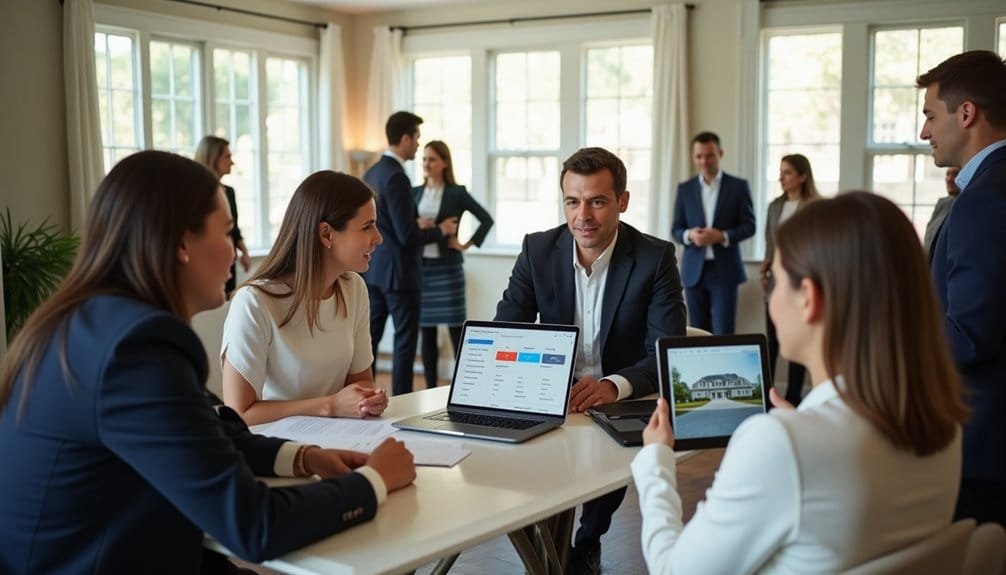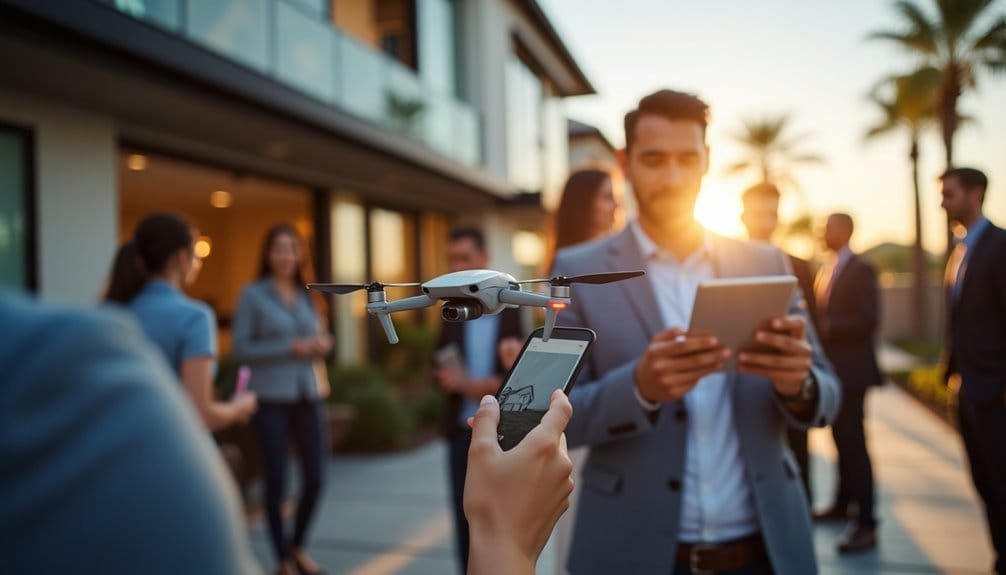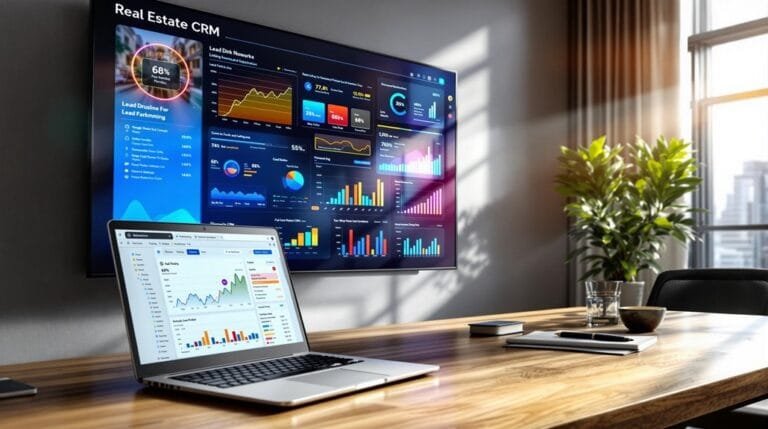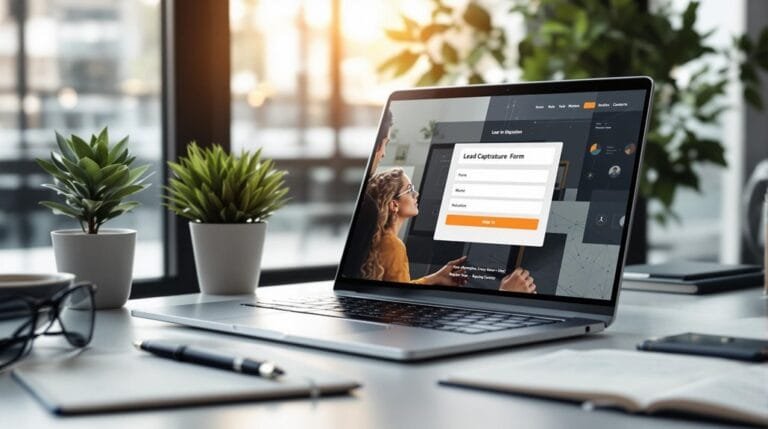Using open houses to generate and nurture real estate leads involves a strategic approach that combines planning, marketing, and community engagement. By coordinating agents and utilizing tools like Delta Media Group’s Open House Connector, you can efficiently manage attendees and follow-ups. Engaging the community through events and door knocking, or staging homes with local artists, increases visibility and interest. Implementing digital solutions, like QR codes for sign-ins and CRM systems, captures and organizes contact information. Immediate personalized follow-ups enhance lead conversion, supported by consistent engagement and feedback. To explore more ways of effectively maximizing open house potential, stay with us.
Key Takeaways
- Implement digital sign-in sheets to efficiently capture visitor information and preferences during open houses.
- Utilize CRM tools for consistent follow-up and personalized communication with leads to enhance conversion potential.
- Employ targeted online advertising and social media promotions to increase open house visibility and engagement.
- Organize community-centered events and neighbors-only previews to foster local connections and generate interest.
- Leverage AI-driven tools for lead generation and nurturing, offering predictive analytics for better lead management.
Planning and Execution

Preparation is the cornerstone of a successful open house. Start by meticulously planning well in advance. This foresight guarantees every detail is covered, from coordinating with other agents to using integrated tools like Delta Media Group’s Open House Connector for managing RSVPs and follow-ups. Your goal is to create a seamless experience for attendees, starting with spreading the word effectively. Invite neighbors by door knocking, cold calling, and distributing flyers to foster community interest. Ensuring all necessary materials are prepared in advance will contribute to a smooth execution of the event, helping to create a positive impression. To maximize attendance, strong advertising is crucial, as it attracts first-time homebuyers and creates networking opportunities with local agents. Incorporating graphic design tools can enhance your promotional materials, making them visually appealing and more effective.
Digital marketing plays an essential role too. While you’ll focus on traditional invitations, don’t neglect the power of digital strategies. Utilize email and social media campaigns to reach a broader audience and create buzz about the event. Collaboration with other agents can further amplify this outreach, making the open house more attractive to potential buyers.
On the day of the open house, execution becomes your primary focus. Welcome attendees warmly and engage with them to build connections. Use QR codes creatively for easy sign-ins and offer virtual tours. Capture the moment by taking photos and videos, showcasing the event’s success. Incorporate interactive elements, like virtual staging, to enhance the visitor experience and leave a lasting impression.
Effective Marketing Strategies
An effective marketing strategy is vital for maximizing the impact of your open house. You can start by implementing targeted online advertising, using social media platforms and real estate websites to reach the right audience. Tailor digital marketing campaigns specifically for your open house event, and consider adding interactive elements to engage potential clients. Promoting virtual open house tours and live streams on social media can expand your reach, while QR codes in marketing materials can direct visitors to sign-in sheets or virtual tours.
Engaging with the local community is another powerful approach. Invite neighbors to the open house to build connections and generate interest. Hosting neighbors-only previews can strengthen relationships and spark curiosity. Organize community events to showcase your commitment and meet potential clients, and align your brand with community values by sponsoring local charities. A local newsletter sharing real estate trends and community news can further cement your presence. Building relationships aids in brand growth and trust, ensuring that your efforts resonate with the community and potential clients alike. In fact, hosting a private open house for locals can not only build long-term relationships but also create opportunities for future referrals.
Leveraging social media is important, too. Live stream open house tours on platforms like Facebook, Twitter, and Instagram, and share these videos for a broader reach. Engage with potential clients by responding to comments and messages, and repurpose content for Instagram Reels and TikTok to keep the conversation going.
Lead Capture Techniques

Maximizing the impact of your open house doesn’t stop with effective marketing; capturing leads is just as important. To guarantee you’re gathering the necessary contact information, employ a variety of physical and digital lead capture methods. Start with detailed sign-in sheets or QR code sign-ins to collect basic information efficiently. Clipboards with surveys can provide additional insights into visitors’ preferences and feedback. Door hangers offer a way to reach those who couldn’t attend, while interactive property tours keep attendees engaged and interested. Since open houses are effective for establishing brand presence in desired neighborhoods, this visibility can naturally lead to more captured leads. Employing AI-driven lead generation innovations, such as using AI chatbots for instant customer engagement, can further enhance your lead capture efforts. Additionally, implementing CRM tools can help streamline the process of managing and nurturing these leads.
Digital strategies also play a vital role. Livestreaming your open house can attract online viewers, encouraging them to provide their contact details. Virtual property tours offer similar benefits, reaching potential buyers who prefer to explore homes remotely. Don’t forget about email campaigns to build lists from registrations, and leverage website chatbots for ongoing engagement.
Implement best practices like segmenting leads in a CRM to personalize future interactions, using lead qualifying questions to assess interest levels, and offering incentives to encourage sign-ins. Technology integration, such as AI-integrated CRM systems and digital sign-in stations, can enhance your lead capture efforts, guaranteeing you’re well-prepared to nurture these connections.
Follow-Up Tactics
In real estate, effective follow-up tactics can make the difference between a warm lead and a missed opportunity. Immediate contact is essential; send follow-up materials the same day, ideally by 7 pm, to keep the property fresh in attendees’ minds. Personalize your communication by using data collected during the open house, addressing specific interests or concerns. Inform potential buyers about new listings or similar properties in the area to maintain their interest. Request feedback on the open house experience and don’t hesitate to ask for referrals. Utilize a CRM system to manage and track these interactions, ensuring consistent communication. Consistent follow-up can enhance relationships and lead to future sales, emphasizing the importance of nurturing leads. Engage your leads with creative content like selfie videos, which add a personal touch, or follow-up surveys to gather more feedback. Additionally, consider implementing automation tools to streamline your follow-up process and improve efficiency. Keep attendees interested with exclusive offers, such as market insights or community news, and consider offering partnership services like loan programs or interior design consultations. Timing is everything, so schedule your follow-up strategy carefully. Send a detailed report the next day, and maintain engagement with weekly check-ins and monthly updates. Leverage tools like email drip campaigns and AI-powered personalization to streamline and enhance your follow-up efforts. Sign-Up Sheets serve as a primary tool for collecting leads at open houses, and using them effectively can significantly increase your potential for successful follow-ups.
Conversion and Analysis

Converting leads from open houses into successful sales is a nuanced process that requires strategic analysis and methodical follow-up. On average, you’ll see about six attendees per open house, from which three become leads. Though the immediate conversion rate is relatively low—7% at 90 days, increasing to 10% at six and twelve months—the key to improving these numbers lies in understanding your leads and nurturing them effectively. Utilizing digital sign-in sheets is vital for capturing contact information and gaining insights into visitor interests. They allow you to tailor your follow-up strategies, ensuring that each communication resonates with the potential buyer’s needs. This personalized approach increases the likelihood of conversion over time. Building strong client relationships through consistent engagement can further enhance your ability to convert leads. Digital records provide sellers with documented interest in the property, aiding negotiations and enhancing the overall sales strategy. Promoting your open houses through various channels, including MLS, Zillow, social media, email newsletters, and neighborhood outreach, boosts visibility and engagement. The awareness generated from these efforts often leads to long-term benefits, such as increased name recognition and community presence. Consistent analysis of your open house results helps refine your strategies, making each subsequent event more effective at generating quality leads. By focusing on these aspects, you can turn initial interest into closed deals, ultimately enhancing your success in real estate.
Community Involvement
Through engaging with the community, you can transform a traditional open house into a vibrant event that fosters deeper connections and showcases your commitment to the neighborhood. Start by inviting local artists and craftsmen to stage properties, which not only enhances aesthetics but also supports community businesses. Host neighborhood-exclusive open houses, allowing neighbors to preview properties before they’re publicly listed, fostering a sense of inclusion and excitement. Additionally, consider implementing client appreciation events that further strengthen relationships with local residents.
To further immerse potential buyers, organize brief tours highlighting local amenities like parks, schools, and popular restaurants. Collaborate with local businesses to sponsor events, offering prizes and activities that draw in visitors. Open houses provide convenience for potential buyers, as they allow spontaneous visits without pre-booking, which increases property exposure to a wider audience. Personalized invitations for neighbors can emphasize community involvement, making them feel valued and connected.
Engage with neighbors by asking about their preferences and potential moving plans. Offer market analysis certificates as a thank you, reinforcing your role as a trusted expert in the area. Consider hosting educational open houses with specialists discussing home improvement and finance, adding value to the experience.
Innovative Tools and Technology

Jump into the future of real estate with innovative tools and technology that are transforming open houses into seamless, efficient experiences. By leveraging digital solutions like the Spacio app, you streamline the open house process, capturing more leads with digital sign-ins instead of outdated pen and paper. Starting at $25 a month, Spacio acts as a lightweight CRM, integrating smoothly with your existing systems to enhance follow-up efforts. Meanwhile, Open Home Pro offers a free plan for unlimited digital sign-ins, with a premium option that includes custom lead follow-up emails, effectively personalizing your outreach.
For those seeking automation, Open House Wizard digitally captures visitor info, automates follow-ups, and offers a starting price of $18 a month. It focuses on improving visitor experience with branded content and seamless CRM integration. Curb Hero and Happy Open House apps further simplify digital sign-ins and lead management, offering intuitive setups and personalized branding.
AI-driven tools like Luxury Presence’s AI Lead Nurture use chatbots for instant engagement and predictive analytics for lead scoring. Data-driven insights enhance decision-making and improve the overall client experience, combining technology with personal expertise. Combined with AI-integrated CRMs, these technologies automate lead nurturing, providing insights into personalized property recommendations and enhancing conversion rates through data-driven strategies.
- Prepare for Loan Maturities and Refinancing Waves as a Real Estate AgentIn mastering loan maturities and refinancing waves, uncover strategies every real estate agent needs to empower clients during pivotal financial transitions.
Measuring Success and Improvements
As you harness innovative tools and technology to enhance open house experiences, it’s important to measure the effectiveness of these efforts. Start by defining your key performance indicators (KPIs) such as attendee numbers, lead conversion rates, engagement levels, lead quality, and follow-up response rates. These metrics provide a clear picture of your open house’s impact, allowing you to adjust strategies accordingly.
Collect data systematically through sign-in sheets or QR codes to capture attendee information efficiently. Use feedback forms to gather insights into attendee experiences and preferences. Integrating this data into your CRM system enables detailed analysis, helping you understand lead behavior and potential. Monitor engagement on email and social media to further gauge interest and reach.
To evaluate lead quality, utilize lead qualifying questions and create buyer or seller profiles. Conduct follow-up conversations and market analysis to refine your understanding of their needs and potential. Develop nurturing strategies tailored to different lead profiles. Additionally, leveraging CRM platforms can centralize communication and streamline your lead management process.
For continuous improvement, regularly review and refine tactics based on performance data. Enhance marketing efforts and invest in training to boost agent skills. Implement attendee feedback to improve future events, and collaborate with other agents to share best practices.
Frequently Asked Questions
Recent Posts

The Power of Testimonials and Reviews in Real Estate Marketing

How to Use Facebook Ads to Generate Real Estate Leads
How Do You Handle Difficult Visitors During an Open House?
When handling difficult visitors during an open house, you should create a welcoming atmosphere by greeting each person warmly, encouraging them to sign in as a security measure. Engage different personalities by setting up a conversation hub and offering valuable insights about the property or area. Always prioritize safety by having a team present and securing valuables. Building trust is essential, so follow up with visitors, offering additional services to strengthen connections.
What Legal Considerations Should Be Taken Into Account for Hosting Open Houses?
When hosting open houses, you must guarantee compliance with legal requirements. Obtain written agreements, like the Open House Visitor Non-Agency Disclosure, to clarify agency roles. This protects all parties and guarantees transparency. Follow the NAR settlement by having sign-in forms ready, showing that agents represent the seller unless otherwise agreed. Stay informed about updates and consult with your broker to align with policies, guaranteeing a smooth and compliant open house experience.
How Do You Ensure the Safety of the Property During an Open House?
Ensuring property safety during an open house involves several key steps. First, install security cameras to monitor all activities. Remove or secure all valuables, and consider having a homeowner’s insurance policy in place. Require visitors to present photo IDs and sign in with their information. Keep the main entrance open while locking others, and have an assistant manage entry. Afterward, thoroughly check the property to confirm everyone has left, ensuring nothing is amiss.
What Are the Costs Involved in Hosting an Open House?
When you’re hosting an open house, be prepared for various costs. Marketing expenses like online listings and print ads range from $800 to $2,500. Cleaning and staging can run between $600 to $2,300. Security, refreshments, and utility expenses add $150 to $500 to your budget. Agent fees, typically 1.5% to 3% of the sale price, might cover hosting costs, but always confirm. Consider all these when budgeting for your event.
What Role Does Staging Play in the Success of an Open House?
Staging plays a pivotal role in the success of an open house by transforming a property into an inviting and appealing space. You’ll find that a well-staged home helps potential buyers imagine themselves living there, often leading to a heightened interest. By focusing on neutral colors, decluttering, and showcasing the property’s best features, you can increase its perceived value, attracting more serious buyers and ultimately boosting engagement and conversion rates.
Bottom Line
By embracing open houses, you ironically transform a simple event into a powerful tool for generating and nurturing real estate leads. While some may overlook the value of face-to-face interactions, your strategic planning and execution prove otherwise. You capture leads effectively, leveraging modern technology and community involvement. However, it’s the thoughtful follow-up and analysis that truly convert leads into loyal clients. In the end, your success isn’t just measured in sales, but in community connections and continuous improvement.







